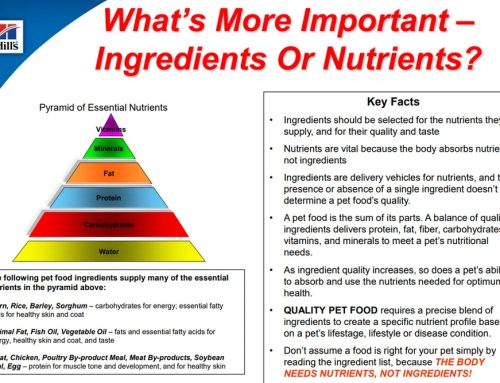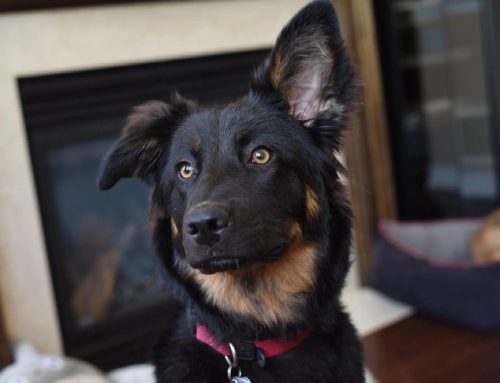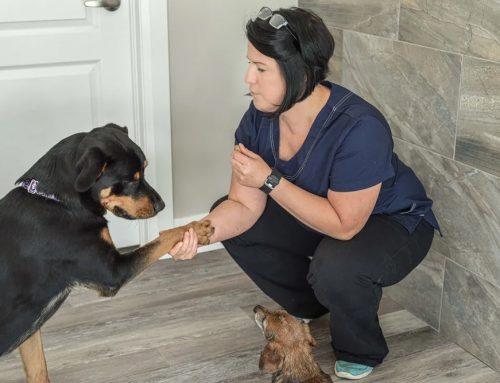Puppy Vaccinations | Schedule and Types
Congratulations on your new puppy!
So you’ve brought your puppy home from the breeder or shelter. You’re working on potty training but now you need to call your vet to schedule your puppy’s vaccines. One question we are commonly asked is “what vaccines does my puppy need and when?”.
Every puppy’s vaccine protocol is structured based on their previous vaccinations, breed, size, individual lifestyle and risk exposure. In Oakville, dogs are exposed to diseases associated with exposure to other dogs in an urban setting but also disease carried by wildlife. We recommend four core vaccinations for your dog, Rabies, Distemper combination, Kennel Cough vaccine and Leptospirosis. Currently, vaccination against Lyme Disease is not a core vaccine, but is recommended for at risk dogs.

All vaccine recommendations are in accordance with the World Small Animal Veterinary Association (WSAVA) vaccination guidelines.
There are four “core” vaccinations we recommend for all puppies:
Distemper combination (DHPPi)
This combo vaccine vaccinates against a combination of potentially fatal viruses which affect the gastrointestinal, neurological and respiratory systems.
Canine distemper is a highly contagious and often fatal viral disease that affects the respiratory, gastrointestinal and central nervous systems. Our resident wildlife in Oakville, especially those cute little raccoons are carriers of distemper.
Canine Hepatitis primarily affects the liver, it is extremely contagious and often fatal. Pets that recover become carriers of the virus and can infect other dogs.
Parvovirus is one of the most serious and common of canine infectious diseases. It is extremely contagious and outbreaks. This virus causes severe gastrointestinal disease which can lead to dehydration and collapse. Puppies and older dogs are most at risk of these diseases but unvaccinated dogs of all ages are at risk.
Rabies
Rabies is a fatal viral disease that affects the nervous system that can affect humans but also your dog. In Canada, the animals that most often transmit rabies are bats, skunks and foxes. There have been over 100 confirmed cases in Ontario. Up to date Rabies vaccination in pet dogs is also a legal requirement.
Canine Infectious Respiratory Disease – Kennel Cough
This is a highly contagious upper-respiratory infection caused by several viruses and a bacteria called Bordatella. Dogs that visit dog parks, boarding kennels, groomers, shows or interact with other dogs should be vaccinated.
Leptospirosis
Leptospirosis is a bacterial disease shed in the urine of wildlife such as raccoons, skunks, beavers and rodents, which can cause fatal kidney and liver failure. It is also a disease that can be spread from dogs to humans. It is very difficult to prevent exposure to Leptospirosis, every dog that ventures outdoors is at risk. Vaccination is an affordable and effective way to protect your dog from a disease that can be very difficult and costly to treat.
Deworming
We recommend all puppies are dewormed for a minimum of three treatments to eliminate any potential parasites which may have been transmitted prenatally.
Heartworm, flea and tick prevention
We recommend year round flea and tick prevention for dogs in Ontario. Heartworm preventative is given to dogs from June 1st until November 1st.
General Puppy Vaccination Schedule
- 8-9 weeks of age
- 1st Distemper Combo (some breeders will give this vaccine)
- 1st Leptospirosis Vaccine
- Kennel Cough Vaccine
- Deworming
- Flea, tick and heartworm preventative
- 12 weeks of age
- Rabies vaccine – puppies must be over 12 weeks old to be given the Rabies vaccine
- 2nd Leptospriosis Vaccine
- 2nd Distemper Vaccine
- Deworming
- Flea, tick and heartworm preventative
- 16 weeks of age
- 3rd Distemper Vaccine
- Deworming
Non “core” vaccine: Lyme Vaccine
Ontario is considered an ‘endemic’ (regularly found) area, as is the U.S indicating dogs may be exposed to ticks carrying Lyme disease. If your puppy will be vacationing at cottages and along waterways, running through tall grass, exploring ravines or wooded areas and travelling to the U.S we recommend vaccination. This vaccine requires two doses given 2-4 weeks apart.
Why does my puppy need a series of vaccines?
Normally vaccines can stimulate immunity in one or two vaccinations. However, young puppies receive protection from their mother’s milk called maternally derived antibodies (MDR). These antibodies protect your puppy from viruses and bacteria but they can also block the immune system from responding to vaccines. These antibodies protect each puppy for a highly variable amount of time, the level of maternal antibodies declines anywhere from about 3 weeks of age and are usually gone by 14-16 weeks of age. Every puppy’s level of maternal antibodies is different depending on their individual immune systems, how long they nursed their mother for and if their mother was vaccinated.
Vaccinations for major viral diseases are administered at 3-4 week intervals to provide disease protection to your puppy as their level of maternal antibodies decreases and to ensure the vaccines we administer properly activate the puppy’s immune system.
Our team is here to get you and your puppy off to the right start. If you have any questions about your puppy’s vet care or to schedule an appointment, call us at 905 208 9933.






